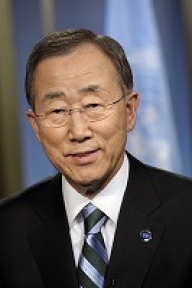G20に寄せる事務総長の寄稿文 「時間はあとわずか」
2011年11月03日
先進国に新興国を加えた主要20カ国・地域(G20)首脳会議が、11月3日、4日の2日間にわたり、フランスのカンヌで開催されます。潘基文(パン・ギムン)国連事務総長はG20の開催にあたって寄稿文を発表し、「今日、正しい決定を下すことが、明日の世界の姿を決める」と述べて、各国政府が直面する様々な課題解決に向けて団結し、大胆な解決策を示すよう呼びかけています。
寄稿文の日本語訳とオリジナル英文は以下の通り。
***
「時間はあとわずか」
潘基文(パン・ギムン)国連事務総長
世界人口が70億人に達した今、警鐘が鳴り響いています。人々による抗議行動が勢いを増していることは、経済不安の高まり、市場の不安定化、そして格差の拡大が危機的水準に達したという明らかな事実を浮き彫りにしています。
あまりにも多くの人々が、不安の中で暮らしています。先行きが見えないことに落胆し、将来の見通しの暗さに怒りを覚えているのです。食卓でも公の場でも、疑念が広がっています― 自分の家族やコミュニティのことを真剣に考えてくれる人はいるのだろうかと。この困難な時代に各国政府が直面する最大の課題は、資源の不足ではなく、信頼の不足です。人々は、指導者や公的機関の対応に信頼を失いかけているのです。
カンヌでのG20サミットは、このような状況の中で開催されます。世界の経済大国の指導者たちには、失墜した信頼を回復する歴史的な機会であると同時に、歴史的な責任でもあります。そのためには団結が必要です。危機と不安の中で、指導者たちは明確な目的と大胆な解決策を示さねばならないのです。もう小出しの策を詰めている場合ではありません。2009年のロンドン・サミットで、G20の指導者たちはグローバル金融システムの安定化に向け、勇気と創造力を発揮しました。今回もこのような大胆なリーダーシップが必要です。
財政の逼迫は誰もが認識しています。世界各地で、緊縮財政は至上命令となっています。カンヌ・サミットのとりあえずの優先課題は明らかに、ユーロ圏危機についてブリュッセルで下された決定を支持することにあります。しかし、これら多くの課題に効果的に取り組むためには、グローバルな対応が必要なことも明らかです。
さらに、こうした対応は長期的な社会的課題への取り組みと組み合わせなければなりません。貧しい人々や地球、女性、若者など、弱者を切り捨てる政策をとることはできません。最も責任のない人々が、最も大きな代償を支払っているからです。こうした人々に対し、他の問題が片付くまで待つよう求めることは、逆効果であると同時に、倫理にも反します。世界のリーダーたちはカンヌで、最も豊かで権力を持つ者だけでなく、世界中の国々と人々が幸せに暮らせるようにするための具体的なアクションプランに合意すべきです。
貧しい人々のために:
昨年ソウルで開催されたG20サミットでは、指導者たちが、開発なくして持続的な成長はありえないという基本的な事実を認識しました。新興経済国は将来の牽引役です。世界のリーダーたちはカンヌで、ミレニアム開発目標(MDGs)に体現された貧困解消と成長に向けた課題に関し、強い支持を示さねばなりません。何をすればよいのかはわかっています。私たちは女性と子どもの健康、食料と農業、ジェンダーの平等など、さまざまな課題への取り組みを大きく前進させる政策やプログラムへの投資を続けねばならないのです。
地球のために:
開発なくして持続的な成長はありえないのと同じように、地球を守らずして持続可能な開発はありえません。私たち全員の健康、富、そして幸福は、大気や河川、海洋、土壌と森林、動植物の多様性といった地球の「自然資本」をいかに節約できるかにかかっているからです。
「地球サミット」から20周年に当たる来年6月、国連は持続可能な開発に関する重要な会議を主催します。この「リオ+20」会議は、よりよい未来、すなわち、相互に関連する課題について総合的な解決策を講じられる未来に向け、明確な道のりを定める機会となります。すなわち、食料と水の安全保障に関する新たな取り組みが必要なのです。また、斬新な財源確保手段を含め、気候変動と再生可能エネルギーへの取り組みが必要であることも意味します。そして何よりも、将来を見据えて、10年後のあるべき姿を戦略的に考えることを意味します。世界のリーダーたちは3年前、ロンドンで短期的なグローバル成長を刺激する方策について話し合いました。カンヌでは、賢明な長期的投資の推進を重視する必要があります。今日、正しい決定を下すことが、明日の世界の姿を決めることになるからです。
女性と若者のために:
世界中で、若者と女性が抗議行動を繰り広げています。自分たちの権利を主張し、経済や政治に関する発言力の拡大を求めているのです。女性と若者を合わせると、世界人口の3分の2以上になります。あらゆる意味で、世界の次なる新興経済は女性と若者であるといえます。私たちはこうした人々の声に耳を傾けねばなりません。そして、妊産婦医療から雇用に至るまで、そのニーズを満たし、機会を作り出すために、あらゆる手を尽くさなければならないのです。
G20は、その構成国が属する地域全体で、格差拡大の危機に正面から取り組む必要があります。これを怠れば、いつか必ず手痛いしっぺ返しを食らうことになるでしょう。社会的な疎外と不安の高まりは、あらゆる人々の平和、安全、そして繁栄の見通しを暗くすることでしょう。
カンヌに集まる指導者たちにとって、今回のサミットは一つの試練となります。世界中がその動向を見守っています。サミットで下される決定は直接または間接に、あらゆる国々と人々に影響します。失敗すれば、破壊的な影響が及ぶことになるでしょう。私たちが知恵と先見力を発揮すれば、これを契機として、あらゆる人々にとって健全で環境に優しい、インクルーシブな経済的繁栄の基盤を整備できます。今ともに行動すれば、崖っぷちの状況を脱し、私たちの子孫が暮らす世界を変えることができるのです。この難しい選択をもはや先延ばしできないことに、疑いの余地はありません。時間はあとわずかしか残っていないのです。
The Clock is Ticking
by Ban Ki-moon, Secretary-General of the United Nations
As the world population clock ticks past 7 billion, alarm bells are ringing. The gathering force of public protests is the popular expression of an obvious fact: that growing economic uncertainty, market volatility and mounting inequality have reached a point of crisis.
Too many people are living in fear. They are discouraged by uncertainty and angry at their diminished prospects. Around kitchen tables and in public squares, they are asking: who will deliver for my family and my community? In these difficult times, the biggest challenge facing governments is not a deficit of resources; it is a deficit of trust. People are losing faith in leaders and public institutions to do the right thing.
The forthcoming G20 meeting in Cannes takes place against this dramatic backdrop. The leaders of the world’s largest economies have an historic opportunity — and an historic responsibility — to reduce the trust deficit. To do so, they must unite. Amid crisis and uncertainty, they must offer clarity of purpose and bold solutions. The time for haggling over incremental steps is long gone. At the 2009 summit in London, G20 leaders showed courage and creativity in stabilizing the global financial system. We need similarly ambitious leadership today.
We all recognize that budgets are stretched thin. For much of the world, fiscal austerity is the new order of the day. Clearly, the immediate priority in Cannes will be to support the decisions taken in Brussels on the crisis within the eurozone. Yet just as clearly, any effective response to these multiple challenges must be global.
More, it must be coupled with an ambitious long-term social agenda. We cannot afford to cut loose those who are most vulnerable — the poor, the planet, women and young people. Those least responsible are paying the highest price. Asking them to wait while other problems are solved is not only counter-productive but immoral. In Cannes, leaders should agree to a concrete action plan that advances the well-being of all nations and people, not just the wealthiest and most powerful.
For the poor: At last year’s G20 summit in Seoul, leaders recognized a fundamental reality — there can be no sustainable growth without development. Emerging economies are the drivers of the future. In Cannes, leaders must show strong support for the pro-poor, pro-growth agenda embodied in the Millennium Development Goals. We know what works; we must continue to invest in policies and programs that yield outsized gains — in women and children’s health, food and agriculture and gender equity, to name but a few.
For the planet: Just as there can be no sustainable growth without development, there can be no sustainable development without protecting the planet. Our collective health, wealth and well-being depends on how we husband the earth’s “natural capital” — the air, rivers and oceans, soils and forests, its full diversity of flora and fauna.
Next June, twenty years after the original Earth Summit, the United Nations will host a major conference on sustainable development. Rio+20 is an opportunity to define a clear path to a better future — a future of integrated solutions to interrelated problems. That means new initiatives on food and water security. It means advancing on climate change and renewable energy, including innovative means of financing. Above all, it means looking beyond the horizon and thinking strategically about where we must be a decade from now. Three years ago in London, leaders debated how to “stimulate” short-term global growth. In Cannes, we need to focus on boosting smart long-term investment — making the right decisions today to shape the world of tomorrow.
For Women and Youth: Throughout the world, young people and women have taken to the streets. They are demanding their rights and a greater voice in economic and political life. Together, women and young people make up more than two-thirds of the global population. In every sense, they are the world’s next emerging economy. We must listen to them. We must do all we can to meet their needs and create opportunities, from maternal health care to jobs.
Across the broad geography of its membership, the G20 needs to squarely address the crisis of rising inequality. If we fail to do so, the future will come to us with a vengeance. Social alienation and deepening instability will undermine the prospects for peace, security and prosperity for all.
For the leaders in Cannes, this summit is a test. The world is watching. The decisions taken will affect every country and person, directly or indirectly. A failure would be disastrous. With wisdom and foresight, we can use this moment to lay the foundations for a healthy, green and inclusive economic prosperity for everyone. By acting together, now, we can pull back from the brink and make a difference for generations to come. Let us make no mistake: there can be no deferring these hard choices. The clock is ticking.
* *** *



